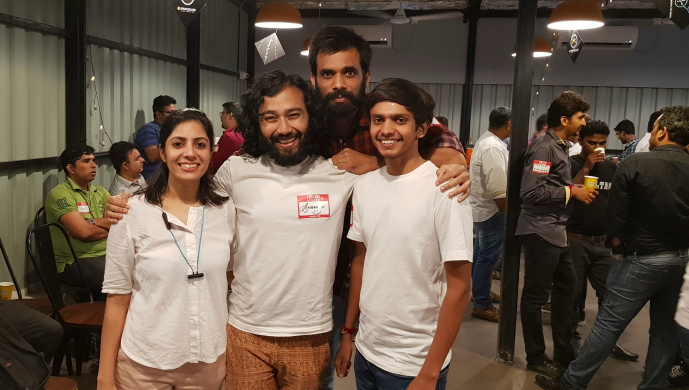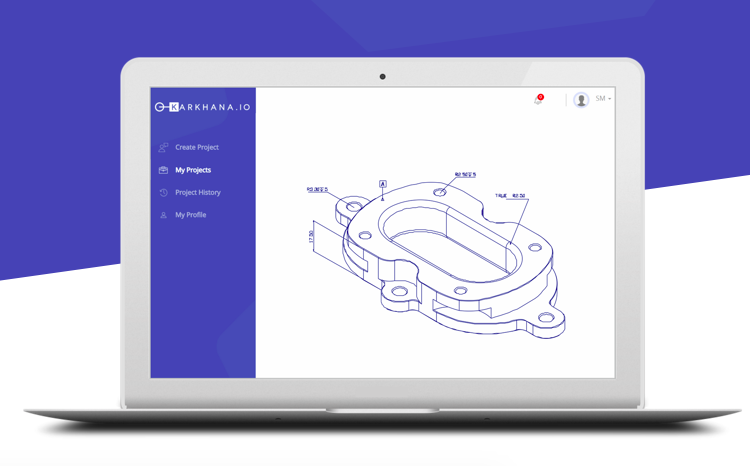She had her mind set on becoming an astronaut, but eventually pivoted to become an innovator in the manufacturing field

Karkhana’s core team with Founder and CEO Sonam Motwani (L)
(Editor’s note: Here is an article from our archives which we think is still relevant)
As a child, she dreamt to become an astronaut. As she grew up, the intensity of her ambition also grew. So after finished schooling, she went on to attend a graduation programme in Aerospace Engineering at IIT Bombay, one of the prestigious higher education institutes in India.
However, this programme changed her mind — and perhaps her life itself.
“During the graduation programme, I made electric race cars for Formula Student UK, and also worked in the Formula Student team of the college as Project Manager,” Sonam Motwani narrates her story to e27.” This was my first encounter with designing and building a serious hardware product ground up. The experience of building four life-size vehicles with a team of 20 sowed the seeds of passion for hardware inside me.”
Soon after completing graduation in 2013, she joined the consumer goods giant Procter & Gamble in its technology division and developed solutions to speed up packing lines for haircare products, before moving to manufacturing sanitary napkins.
“It was sometime during the later half of 2015 when I seriously began considering starting my own business,” she adds. “When I decided to leave my job and start up in the manufacturing industry, my parents were a little apprehensive. But largely they have been supportive of all my career and life decisions. They tried their best to equip me with the right tools for sound decision making and prefer trusting the decisions I make thereafter.”
P&G was a learning experience for Motwani. She learnt how large companies approach product development, sourcing and deployment. Working closely with vendors in China and India gave her insights into challenges in the manufacturing ecosystem.
Also Read: Being a remote-working tech-writer and father has taught me these things
“With deeper analysis, it became more evident that the world of design and manufacturing was pretty much the same as it was a decade ago; the issues such as difficulty in accessing resources, lack of cost transparency and idle unutilised capacity at manufacturers still exist,” she notes.
“I began to see an opportunity in this unaddressed gap, and spent my weekends meeting hardware startups, design firms and manufacturing suppliers in Mumbai, Bangalore and Pune,” she says.
With a mission to address this gap, sometime in 2016, she put together a framework for an online platform that would simplify manufacturing. “I promised myself that if — during this period — I could establish a handful of businesses/innovators and suppliers who find value in my proposition, I would quit the job and commit full time to doing this. Fortunately, I achieved my goal, held myself to the promise, and put in the papers to kick start Rolling Cube in April 2016.”
Rolling Cube was meant to be a custom manufacturing startup that would enable anyone to build customised personalised products at the ease of their desktop.
Disrupting the manufacturing process
“Manufacturing is an industry where there’s quite a big market for B2C, but the supply chain is poorly understood or appreciated by the average customer. This makes pricing a difficult balance to strike. So more than a year ago, we introduced the concept of pooling, wherein we put orders in waitlist until sufficient volume was achieved for optimum material usage, hence optimising the customer’s price point. As it turned out, patience isn’t the customer’s greatest strength either,” she goes on.
 Amidst all this, the bulk of Rolling Cube’s business was coming from its B2B services. The startup got into taking clients through the entire process of new product development — engineering their product design, prototyping various iterations and taking the products into mass production.
Amidst all this, the bulk of Rolling Cube’s business was coming from its B2B services. The startup got into taking clients through the entire process of new product development — engineering their product design, prototyping various iterations and taking the products into mass production.
“A big challenge though was to scale our approach, where we took on any and every manufacturing project like consultants and then tried to source vendors for them. Moreover, our website looked like a very B2C e-commerce platform. The best way ahead for our team of four at this point seemed to be to completely split the B2C and B2B components. So that’s exactly what we did,” Motwani adds.
In July 2018, Rolling Cube revamped the business, and the team behind the project started Karkhana.io.
Karkhana is an online manufacturing platform, which interacts with your design, provides manufacturing feedback and pricing based on its inbuilt algorithm. “We have a large network of skilled suppliers. By identifying machines best suited for each job and intelligently routing orders, we offer a far shorter turnaround time than that of traditional manufacturers,” Motwani shares.
How Karkhana.io works
Step 1 – Submit your design inputs (Upload your design file in the supported format. Select the material and manufacturing process of your choice)
Step 2 – Get design consultation (Review manufacturing recommendations and upload revisions directly on your account. Schedule a call or visit by our engineer for design-related help)
Step 3- Receive quotation and timelines (Get a fair estimate of cost and turnaround time through Karkhana.io’s pricing algorithm which accounts for manufacturing complexity and material utilisation)
Step 4- Place order for any quantity (Make one or many, it will make sure each of your product meets the quality requirements)
Step 5 – Track your order (Track exactly where your project is in the production process from your account).
The company provides manufacturing in over 20 materials, including steel alloys, aluminium alloys, copper alloys and plastics. The manufacturing services include CNC machining, sheet metal fabrication, 3D printing, Injection moulding and vacuum casting.
Challenges of building a hardware startup
According to Motwani, India does not have many women working in the manufacturing industry. And most workshops and industrial units are located in far off, not-so-convenient areas.
“When I started out, I’d visit the suppliers quite often and there were times when certain suppliers didn’t seem comfortable interacting with me. Probably, because it was an exception for them talking to a woman about manufacturing. But with time, as I stayed persistent, it became easier to get new suppliers onboard,” she reveals.
Having worked with a number of customers, including some popular household names in India, and developed a wide variety of hardware products, the company is now looking to achieve scalability.
“The next big milestone we are striving towards for achieving scalability is the automation of our pricing engine and online design for manufacturing feedback on our platform,” she says.
“We believe this will be a game changer in the way manufacturing interactions have been happening and accelerate the hardware development cycles for engineering teams. Our bigger ambition is to digitise the manufacturing ecosystem, which will democratise the process and make it accessible to everybody, just like software.”
Motwani is one of the 30 women entrepreneurs selected for Zone Startups India’s third edition of startup accelerator programme, empoWer.
Talking about the Indian startup ecosystem, she says that a lot of startups in the country aren’t able to reach their key milestones for success due to delay in establishing the product market fit. There might be multiple reasons for this: inability to reach critical mass for validation, lack of a network for feedback and learning, delay in acquiring resources for product development, insufficient funds.
Also Read: How a lazy student who caught and sold spiders transformed himself into a successful founder
“In general, the challenge in India seems to be about finding the right resources at the right time, maybe because the startup ecosystem is still young and developing as compared to the more successful examples that we look up to, such as Silicon Valley or Singapore,” she concludes.
The post How one woman is disrupting the entire manufacturing process in India appeared first on e27.